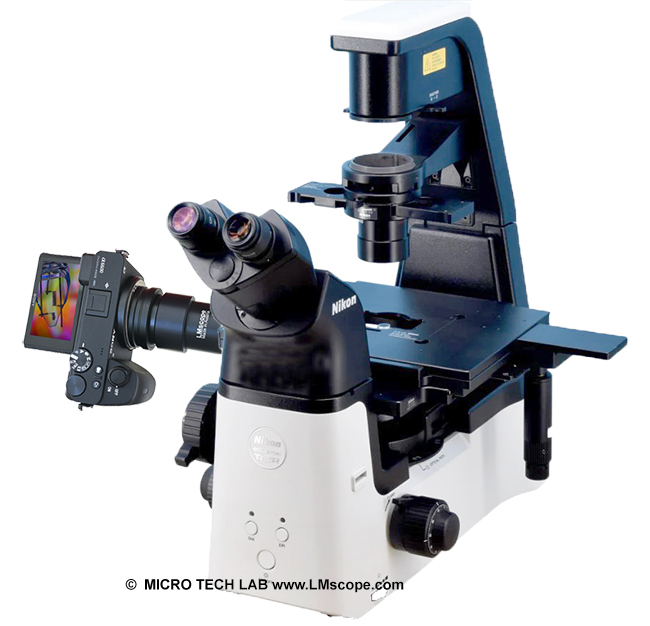

The Nikon ECLIPSE Ts2: combined with our LM microscope adapters, it also excels in photomicrography
Our LM microscope adapters enable the use of state-of-the-art DSLR and system cameras – a combination that delivers exceptional resolution, dynamic range and light sensitivity.
Nikon’s new ECLIPSE Ts2/Ts2R routine inverted microscopes (the successors to Nikon’s Eclipse TS 100) are versatile instruments that are suitable for the entire spectrum of laboratory applications, including cell culture observation. An LED light source for fluorescence microscopy enables the observation of transparent samples with superior clarity and three-dimensional visualisation. In addition to the bright field, APC (Apodized Phase Contrast, a phase contrast technique with reduced halo effects) and phase contrast observation methods, the ECLIPSE Ts2 also features Nikon’s newly developed “Emboss Contrast” technique, which produces images approaching 3-D by using focal illumination, which adds high contrast to samples. This is particularly important for photomicrography. The ECLIPSE TS2-FL comes with an additional epi-fluorescence module that provides high-quality fluorescence observation even in brightly lit rooms.
An optional side camera port (TS2-P-CF Camera Port 100 with 38 mm internal diameter) is available and can be used with our LM digital adapters to connect any DSLR or system camera to the microscope. This offers an alternative to attaching the camera in place of an eyepiece.

The optical system used in these microscopes features Nikon’s acclaimed CFI-60 lenses, which offer the combined advantages of greater working distances and higher numerical aperture. The objectives included with the basic package (10x/22; 15x/16; 20x/12.5) are inserted into the quintuple nosepiece. The optional mechanical stage can accommodate a broad range of specimens.
The ECLIPSE Ts2 series microscopes were designed with the user’s comfort in mind. Their design is as streamlined as possible and they are very easy to clean. Despite their obvious complexity, Nikon’s ECLIPSE Ts2/Ts2R microscopes make a strong design statement – one that garnered the manufacturer the prestigious iF Design Gold Award 2016 for design excellence.
Photography:
Fitting the microscope to digital single-lens reflex (DSLR), mirrorless interchangeable-lens cameras (MILC ), digital single-lens mirrorless (DSLM) or C-mount cameras is easy with our LM digital SLR adapters, which feature a plan achromatic optical system. Our products make it possible to capture top-quality microscope images. To help you select the adapter that is right for your camera, we have set up an online configurator on our website. You can also email us – ideally with attached photographs of your microscope.
Modern DSLR and single-lens mirrorless (DSLM) offer the latest technology and are generally very well suited for microscopy applications. Most of them can be controlled remotely via PC/Mac. Because of their high sales volumes, they offer an excellent price/performance ratio compared to special-purpose microscope cameras.
Features of top DSLR and single-lens mirrorless cameras (DSLM):
- Large, powerful full-frame sensors (36 x 24 mm)
- Sensor resolution of 61 megapixels or 240 megapixels with Pixel Shift technology
- High light sensitivity (ISO 400,000+)
- Extensive dynamic range (up to 15 aperture stops/f-stops)
- Short exposure times (1/8000 second) up to 1/32,000 seconds using the digital shutter
- 4K Ultra HD or 8K Ultra HD video function
- Live video capture on external monitors in ultra HD quality
In most cases, these cameras are significantly more powerful than microscope cameras with smaller sensors (1/2" or 2/3"). On our website you will find our current camera recommendations and a camera ranking which is specifically tailored to microscopy applications.
New LM Digital Adapter for: Sony Alpha 9 III / Nikon Z9 / Nikon Z8 / Sony Alpha 7R V / Sony Alpha 1 II / Sony Alpha 1 / Sony Alpha 9 II (ILCE-9M2) / Sony FX3 Cinema Line / Sony Alpha 9 / Nikon D6 / Canon EOS R3 / Canon EOS R6 Mark II / Canon EOS R8 / Sony Alpha 7R IV / Canon EOS R5 II / Nikon Z6III / Canon EOS R5 / Sony Alpha 7S II / Sony Alpha 7S III / Sony Alpha 7R III / Canon EOS R6 / Nikon Z6 / Nikon Z6II / Sony Alpha 7R II / Nikon Z7 / Nikon Z7II / Canon EOS R / Canon EOS Ra (Astro) / Nikon Z5 / Sony Alpha 7C / Canon EOS RP / Sony Alpha 7S / Canon EOS R7 / Leica SL2-S / Canon EOS R10 / Nikon Z50 II / Canon EOS 1D X Mark III / Nikon Z50 / Nikon Z30 / Nikon Z fc / Nikon D850 / Canon EOS 1D X Mark II / Nikon D780 / Olympus OM-1 / Sony Alpha 7III / Olympus OM-D E-M1 Mark III / Canon EOS R100 / Sony Alpha 6700 / Nikon D5 / Sony Alpha 6600 / Fujifilm X-H2S / Fujifilm X-S10 / Fujifilm X-E4 / Fujifilm X-Pro3 / Olympus OM-D E-M1X / Sony Alpha 6400 / Sony Alpha 6100 / Sony ZV-E10 / Canon EOS 1D X / Nikon D4s / Olympus OM-D E-M5 III / Canon EOS 90D / Canon EOS 5D Mark IV / Nikon D4 / Nikon D750 / Canon EOS 6D Mark II / Fujifilm X-T5 / Fujifilm X-T4 / Fujifilm X-T3 / Sony Alpha 6300 / Sony Alpha 6500 / Nikon D500 / Nikon D810 / Nikon D800 / Canon EOS M6 Mark II / Nikon D800E / Nikon Df / Panasonic Lumix DC-G9 / Nikon D610 / Nikon D600 / Canon EOS 250D / Canon EOS 850D / Rebel T8i / Canon EOS 6D / Sony Alpha 99 II (SLT-A99 II) / Canon EOS M200 / Canon EOS 5DS R ( without low-pass filter) / Olympus OM-D E-M1 Mark II / Canon EOS 80D / Canon EOS M50 Mark II / Canon EOS 5DS / Canon EOS M50 / Sony Alpha 77 II / Canon EOS 70D / Nikon D7200 / Pentax K-1 Mark II / Canon EOS 200D / Canon EOS 800D / Rebel T7i / Canon EOS 77D / Canon EOS 5D Mark III / Canon EOS 60D / Sony Alpha 7R /
